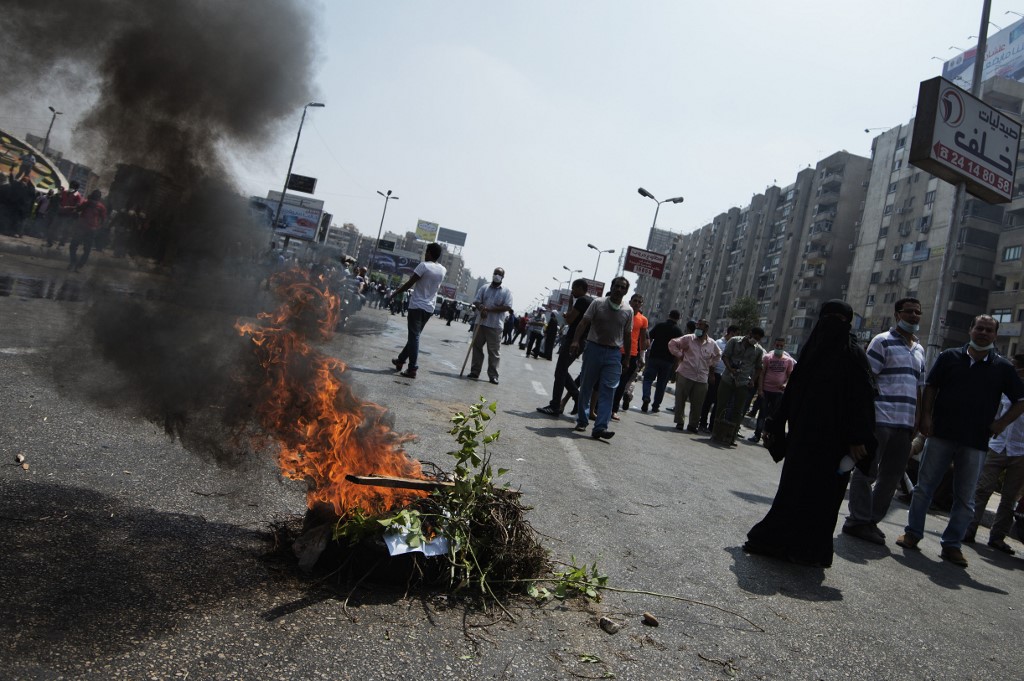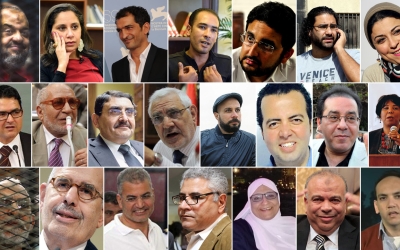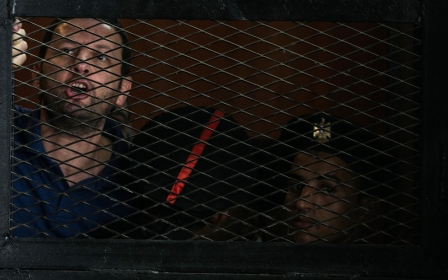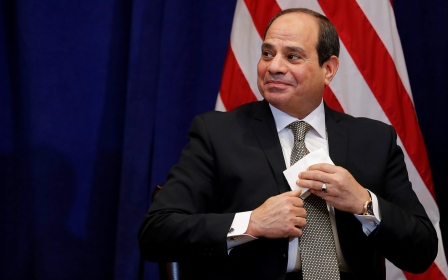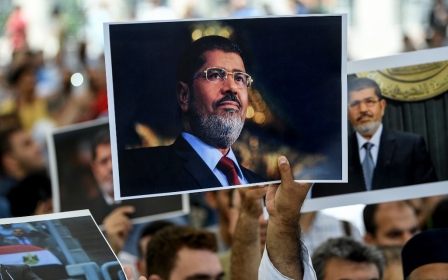Egyptians have good reason to take minister's death threats seriously
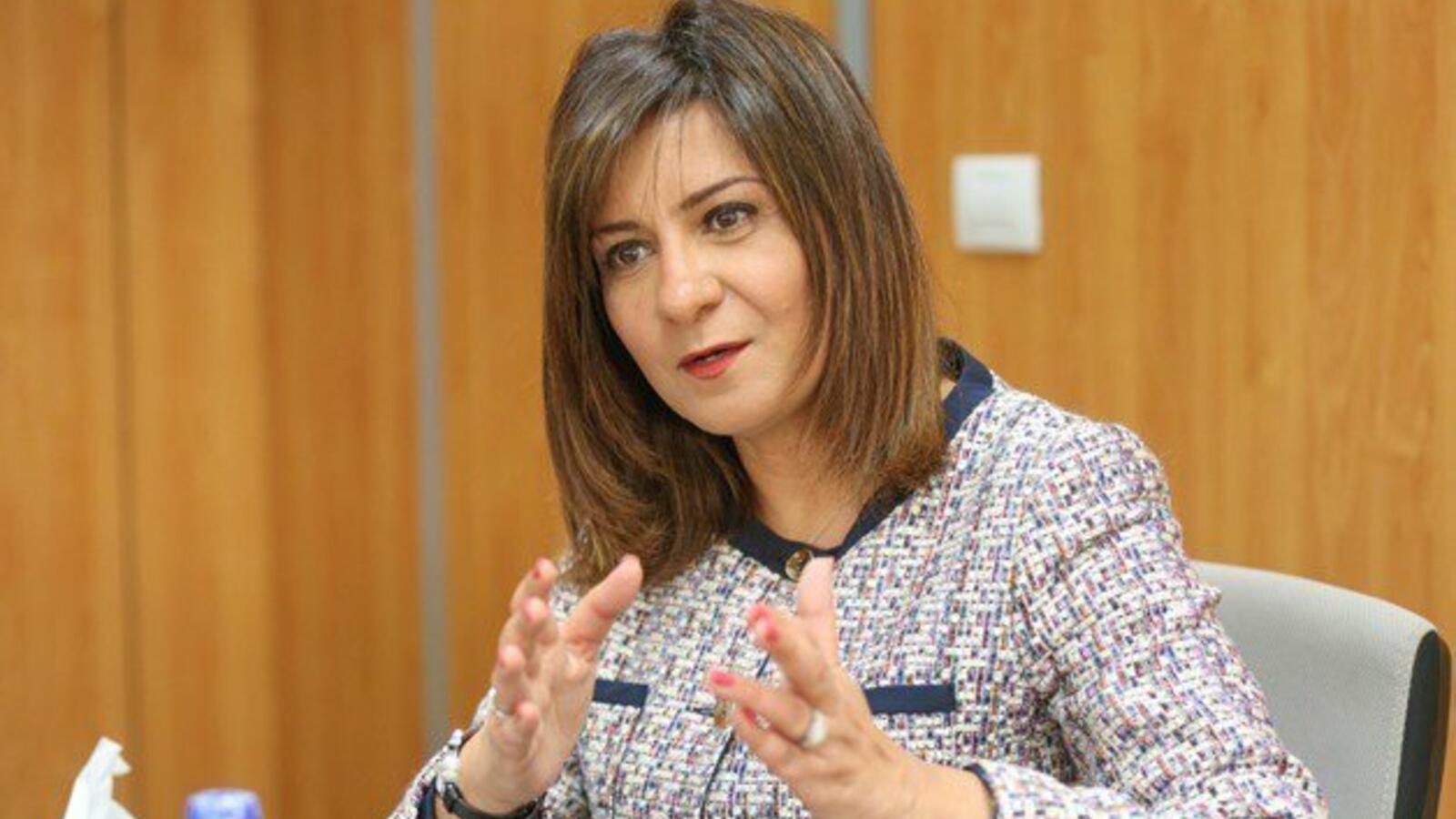
At a meeting with Egyptian-Canadians this week in Toronto, Egypt’s minister of expatriates, Nabila Makram, said that the Egyptian government would “slice up” individuals speaking negatively about the nation. She used an unmistakable throat-cutting gesture to drive home her point.
Unfortunately for Makram, the entire incident, interpreted as a not-so-veiled threat to opponents of President Abdel Fattah al-Sisi, was caught on video.
A shocked international community rebuked the minister, just as one might expect after a notable politician appears to threaten to kill political opponents.
Numerous reports were published in major international media outlets. In the face of this international outcry, Makram was forced to respond.
Deflecting responsibility
New MEE newsletter: Jerusalem Dispatch
Sign up to get the latest insights and analysis on Israel-Palestine, alongside Turkey Unpacked and other MEE newsletters
Rather than own up or apologise, however, she deflected responsibility, suggesting that her critics were out of line and had intentionally misinterpreted her remarks and gesture.
She recorded a detailed response to critics on the Egyptian satellite network al-Mehwar. In the recording, Makram characterised her meeting with Egyptians in Canada as a “beautiful moment” of national pride, and intimated that nothing inappropriate was done or said.
Given this larger context of state violence and mass repression, it is perhaps not unreasonable for Egyptian expatriates to feel threatened
In explaining the controversial remarks and hand gesture, Makram said: “So, I was saying that Egyptians abroad do not tolerate a single negative word said about their country. What do they do to such a person?... I heard one of the voices say [in response to my question], ‘We cut off the neck of anyone who speaks this way about Egypt! And I responded to him, ‘We will slice him up.’”
Makram went on to say that she was simply “agreeing with what [the audience] was saying”, proudly noting that the audience “clapped” after her remarks.
The lack of contextual awareness here is breathtaking. Makram’s response seems to imply that the government for which she works is a beacon of democratic competition, tolerance and human rights, and that critics are foolish for feeling threatened.
Human rights violations
But the current Egyptian regime came to power via a military coup in July 2013, quickly implemented a programme of eliminationism, and is one of the worst violators of human rights in the world.
In addition to committing several small-scale massacres against protesters and gassing more than 30 prisoners to death in a truck in the summer of 2013, the government committed perhaps the worst large-scale massacres of protesters in recent history.
At the 14 August 2013 Rabaa and Nahda square massacres, Egyptian authorities intentionally shot hundreds of unarmed protesters in the neck and head. A year-long investigation of primary evidence by Human Rights Watch revealed that Egyptian security forces might have been “shooting to kill”, that orders were given “at the highest levels of the Egyptian government”, and that the killings constituted “likely crimes against humanity”.
HRW’s report posited that “likely well over 1,000 people” were killed in Rabaa Square alone.
In addition to the mass killings, the government has forcibly disappeared and tortured thousands, blocked thousands of websites, cracked down on NGOs, introduced draconian legislation, and banned all serious political opposition groups and parties, including the Muslim Brotherhood and its political wing Freedom and Justice Party, which won five free-and-fair elections in 2011 and 2012.
Torture and death sentences
The government’s loyal judiciary has issued the largest mass death sentences in modern history. In one ruling, more than 500 Egyptians were sentenced to death for the alleged killing of one Egyptian police officer.
Furthermore, torture is systematic in Egyptian jails, which have been packed with more than 60,000 political prisoners, mostly Egyptians arrested arbitrarily.
An Italian graduate student, Giulio Regeni, was tortured to death by Egyptian police in 2016. An autopsy and other investigations by Italian authorities showed that Regeni’s body was slowly mutilated and burned, and that his fingernails and toenails had been ripped from his body, all before he died.
The government also closely monitors its citizens’ social media posts, looking for signs of regime criticism. On 7 July, an American-Egyptian woman was reportedly arrested over her criticism of Sisi on her personal Facebook page.
Given this larger context of state violence and mass repression, it is perhaps not unreasonable for Egyptian expatriates to feel threatened by Makram’s “slice up” remarks and throat-cutting gesture.
Makram’s denial of responsibility is par for the course for Egyptian authorities. In an interview with the US news programme 60 Minutes earlier this year, Sisi denied several well-established facts about the Egyptian regime, and then tried to block the interview from airing.
Silencing critical citizens
The Egyptian government has repeatedly denied any involvement in Regeni’s murder, despite overwhelming evidence of its guilt. More broadly, the government also continues to deny it tortures detainees, despite hard evidence gathered by HRW and Amnesty International.
In 2016, Egyptian Foreign Minister Sameh Shoukry complained that global news media, human rights groups and scholars were grossly exaggerating the number of prisoners in Egyptian jails. I wrote a response to Shoukry’s claims: in my article, I used the Egyptian government’s own published reports about arrests to demonstrate the accuracy of news, human rights and scholarly reports about Egypt’s prisoner population.
It is a matter of time before Egyptian authorities carry out another abuse of power and then employ their deny-and-deflect strategy
It is a matter of time before Egyptian authorities carry out another abuse of power and then employ their deny-and-deflect strategy.
In the meantime, critics of the Egyptian government, including those abroad, are not completely out of line for feeling threatened by Makram’s throat-slitting remark and gesture.
Larger context is important. Egypt takes its lead these days from close allies Saudi Arabia and the United Arab Emirates, which, together, financed and otherwise supported the 2013 coup and its aftermath.
Both of these nations have used intimidation to silence critical citizens living abroad. Importantly, and ominously, Saudi Arabia killed a Saudi expatriate journalist, Jamal Khashoggi, in Turkey in October 2018.
One can hope that Makram’s remarks merely represent clumsy authoritarian musings, and not a serious declaration of Egypt’s intent to venture into the expatriate assassination game.
The views expressed in this article belong to the authors and do not necessarily reflect the editorial policy of Middle East Eye.
Middle East Eye delivers independent and unrivalled coverage and analysis of the Middle East, North Africa and beyond. To learn more about republishing this content and the associated fees, please fill out this form. More about MEE can be found here.



